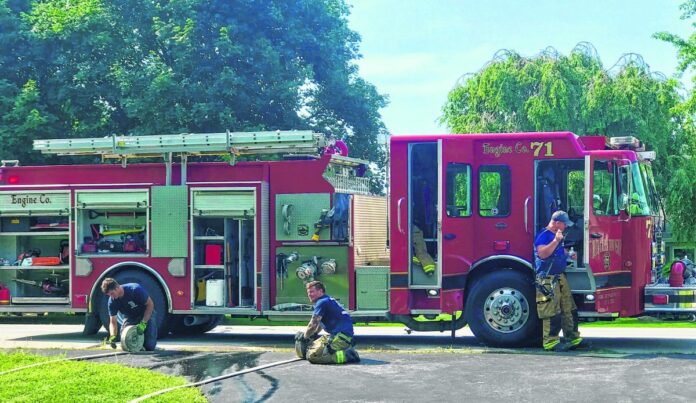
GREENFIELD — Hancock County’s township fire departments are raising the alarm, saying they need more funding from the county to cover costs that tax revenue can’t keep up with.
At a meeting of the Hancock County Council on Wednesday, May 12, representatives of the county’s township fire departments, some of which are staffed partially or mainly by volunteers, said property tax revenue they receive is not enough to cover their costs. They requested additional funding from the county.
Dave Sutherlin, the chief of Buck Creek Township Fire Department, spoke at the meeting on behalf of eight township fire departments, representing all parts of Hancock County except for Center Township, where Greenfield is located. The departments include Sugar Creek, Buck Creek, Green, Vernon, Brown, Jackson and Blue River townships, as well as the Fountaintown Fire Department, which protects Brandywine Township.
In total, the Hancock County Firefighters Mutual Aid Association requested $282,308 from the county to cover its costs, mostly for insurance needed in order to provide fire services.
Sutherlin said it is common for fire departments in Indiana to need extra funding once the property tax cap has been reached.
“It is one thing that we all have in common,” he said. “We are not the only fire department mutual aid association that asks for this from the county (where it is located).”
It’s also not the first time the mutual aid association has had to ask for additional funds. In 2020, it requested $128,213. The county eventually agreed to pay that amount out of a $5 million general obligation bond it had taken out.
Sutherlin said the amount increased so dramatically this year because the departments included the cost of workman’s compensation insurance, which they are required by law to carry, in the request.
“We all pay a pretty big portion of our budget toward workman’s comp insurance,” he said.
Later in 2020, Vernon Township created the Vernon Township Fire Protection Territory, which includes Fortville and McCordsville as well as the township’s unincorporated areas. Though it’s intended to raise revenue, the territory still had to ask for money from the county to cover a shortfall this year, about $61,000.
While the change will eventually result in higher tax revenue for Vernon Township, it doesn’t fully take effect until 2022, and even then will only impact properties that have not already reached the state’s tax cap.
By state law, property taxes cannot exceed 1% of property values for owner-occupied property, 2% for other residential property and farmland, and 3% for all other properties, including commercial buildings.
County council members were reluctant to consider using revenue from the local income tax, part of which is used for public safety funding. Those funds also go to county law enforcement, and the council already is working to adopt a pay raise for sheriff’s deputies.
“We’re scrambling to get money to pay our people; this comes right out of that,” council member Jim Shelby said.
Sheriff Brad Burkhart has pointed to brisk growth in the western townships and the growing number of industrial buildings as a reason his department needs additional employees and higher salaries. That’s also a reason why fire budgets are stretched, Sutherlin said.
“We cannot operate with gaps like we currently have,” he said.
The real problem, Sutherlin said, isn’t local: it’s that the state legislature, by imposing the current property tax cap, does not allow tax revenue to keep pace with growth in communities like Hancock County.
For that reason, Sutherin thinks the ultimate solution to the funding problem will probably lie in lobbying state legislators to lift the property tax cap or find another way to introduce more tax revenue for public safety.
“If this is the way they’re going to do it, you can expect services to be insufficient at some point,” he said.
Members of the county council ultimately requested that the fire departments come up with a way to reshuffle their budgets and make a request for capital funding instead so that the county would be able to pay for it out of another fund. The mutual aid association will return to the council’s first meeting in June to make another request.
